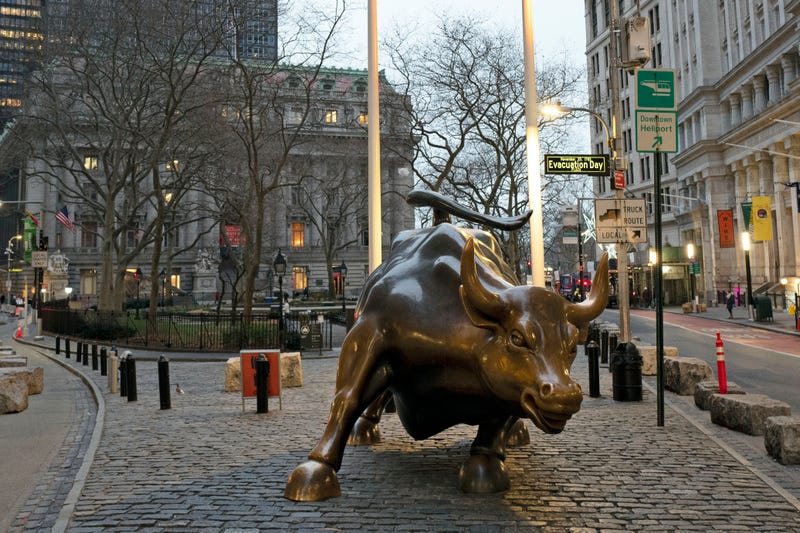
NEW YORK (AP) — U.S. stocks wobbled lower as Wall Street questioned whether the U.S. job market has slowed by just enough to get the Federal Reserve to cut interest rates to help the economy, or by so much that a downturn may be on the way. After rising to an early gain Friday, the S&P 500 erased it and fell 0.3% from the all-time high set the day before. The Dow Jones Industrial Average dropped 0.5%, and the Nasdaq composite was nearly flat. Still, more stocks rose than fell. The action was more decisive in the bond market, where yields tumbled following discouraging data on the job market.
THIS IS A BREAKING NEWS UPDATE. AP’s earlier story follows below.
NEW YORK (AP) — U.S. stocks are wobbling lower on Friday as Wall Street questions whether the U.S. job market has slowed by just enough to get the Federal Reserve to cut interest rates to help the economy, or by so much that a downturn may be on the way.
After rising to an early gain, the S&P 500 erased it and fell 0.5% below the all-time high it set the day before. The Dow Jones Industrial Average was down 245 points, or 0.5%, as of 2:30 p.m. Eastern time, after swinging between an early gain of nearly 150 points and a loss of 400. The Nasdaq composite slipped 0.2%.
The action was more decisive in the bond market, where Treasury yields tumbled after a report from the Labor Department said U.S. employers hired fewer workers in August than economists expected. The government also said that earlier estimates for June and July overstated hiring by 21,000 jobs.
The disappointing numbers follow last month’s weaker-than-expected jobs update, along with other lackluster reports in intervening weeks, and traders now are betting on a 100% probability that the Fed will cut its main interest rate at its next meeting on Sept. 17, according to data from CME Group. Such cuts can give a kickstart to the economy, but the Fed has held off on them this year because they can also give inflation more fuel.
Until now, the Fed has been more worried about the potential of inflation worsening because of President Donald Trump’s tariffs than about the job market. But Friday’s job numbers could push the Fed to consider cutting rates by a deeper-than-usual amount in two weeks, said Brian Jacobsen, chief economist at Annex Wealth Management.
“This week has been a story of a slowing labor market, and today’s data was the exclamation point,” according to Ellen Zentner, chief economic strategist for Morgan Stanley Wealth Management.
Strong hiring for health care jobs had been helping to support the overall market for years, “but with it now showing some tangible signs of decline, the foundation underneath the labor market seems to be cracking,” said Rick Rieder, chief investment officer of global fixed income at BlackRock.
While the data on the job market is disappointing, it’s still not so weak that it’s screaming a recession is here, and the U.S. economy is continuing to grow. A big question for investors is whether the job market can remain in a balance where it’s not so strong that it prevents cuts to interest rates but also not so weak that the economy falls off.
Uncertainty about that helped lead to Friday’s swings in the stock market. Wall Street needs things to go as hoped because it already sent stock prices to records amid expectations for a Goldilocks scenario where interest rates ease, and the economy keeps chugging along.
On Wall Street, Friday’s heaviest weight on the stock market was Nvidia, the chip company that’s become the face of the artificial-intelligence boom. It’s been contending with criticism that its stock price charged too high, too fast and became too expensive following Wall Street’s rush into AI, and it fell 2.8%.
Lululemon dropped 18.1% after the yoga and athletic gear maker’s revenue for the latest quarter fell short of analysts’ expectations. CEO Calvin McDonald pointed to disappointing results from its U.S. operation, while Chief Financial Officer Meghan Frank said Lululemon is facing “industrywide challenges, including higher tariff rates.”
Still, more stocks rose on Wall Street than fell. Leading the way was Broadcom, which climbed 9.5% after reporting better profit and revenue for the latest quarter than analysts expected. CEO Hock Tan said customers are continuing to invest strongly in AI chips.
Tesla rose 3.8% after proposing a payout package that could reach $1 trillion for its CEO, Elon Musk, if the electric vehicle company meets a series of extremely aggressive targets over the next 10 years.
Smith & Wesson Brands jumped 6% after the gun maker delivered better results for the latest quarter than analysts expected. It reported a loss, but CEO Mark Smith said it saw good demand for its new products in what’s traditionally a slow season for sales of firearms.
In stock markets abroad, indexes in Europe lost early gains to turn lower with Wall Street. That followed strength across much of Asia.
In Tokyo, the Nikkei 225 rallied 1% after data showed accelerating growth in earnings for Japanese workers. Chinese markets rebounded following three days of decline, with indexes rising more than 1% in both Hong Kong and Shanghai.
In the bond market, the yield on the 10-year Treasury tumbled to 4.08% from 4.17% late Thursday and from 4.28% on Tuesday. That’s a notable move for the bond market and could mean lower interest rates are coming for mortgages and other loans.
___
AP Writers Matt Ott and Teresa Cerojano contributed.